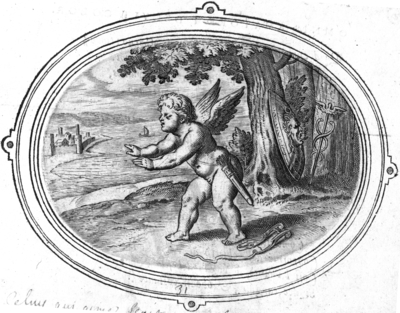Otto Vaenius, Amorum emblemata (1608)
Table of contents ↑Amans quid cupiat scit, quid sapiat, non videt [31]

Translations
 |
Publilius Syrus, Sententiae A 15
Een minnaar weet waarnaar hij verlangt, maar hij ziet niet wat verstandig is. |
 |
Publilius Syrus, Sententiae A 15
A lover knows what he desires, but he does not see what is wise. |
 |
Blinde Cupido, wat dwaal je van de rechte weg af? Luister naar de adviezen van Rede en Minerva. Je bent blind en evenzo maak
je minaars blind, die met gesloten ogen hun ondergang tegemoet snellen. |
 |
Blind Cupid, what do you deviate from the straight path? Listen to the advice of Reason and Minerva. You are blind and likewise
you blind lovers who rush into their ruin with their eyes closed. |
 |
Publilius Syrus, Sententiae A 22
Een god kan nauwelijks tegelijkertijd liefhebben en verstandig zijn. [Liefde en verstand gaan nauwelijks samen]. |
 |
Publilius Syrus, Sententiae A 22
Wisdom with love is scarcely granted to a god. [Love and wisdom hardly go together.] |
Sources and parallels
- Cupid blinded/blindfolded:
-
Parallel for the pictura (mirrored, less detailed, with a figured frame) and a parallel for the mottoes (the Latin,
Italian, French ones; the Dutch and English ones are not exact the same) in : Un Amour aveugle
 (in: Daniel de la Feuille, Devises et emblemes (1691)
(in: Daniel de la Feuille, Devises et emblemes (1691) )
[Compare
)
[Compare ]
]
-
Cupid blinded/blindfolded in: Amor cæcus [6]
 (in: anonymous, Thronus cupidinis (1620)
(in: anonymous, Thronus cupidinis (1620) )
[Compare
)
[Compare ]
]
-
Buschoff 2004, p. 115, note 712. Also here Love chooses without sense:Amor cæcus. [15]
 (in: Daniël Heinsius, Ambacht van Cupido, from: Nederduytsche poemata (1616)
(in: Daniël Heinsius, Ambacht van Cupido, from: Nederduytsche poemata (1616) )
[Compare
)
[Compare ]
]
References, across this site, to this page:
- Un Amour aveugle
 (in: Daniel de la Feuille, Devises et emblemes (1691)
(in: Daniel de la Feuille, Devises et emblemes (1691) )
)
- Amor cæcus. [15]
 (in: Daniël Heinsius, Ambacht van Cupido (1613)
(in: Daniël Heinsius, Ambacht van Cupido (1613) )
)
- Amor cæcus. [15]
 (in: Daniël Heinsius, Ambacht van Cupido, from: Nederduytsche poemata (1616)
(in: Daniël Heinsius, Ambacht van Cupido, from: Nederduytsche poemata (1616) )
)
- Amor cæcus [6]
 (in: anonymous, Thronus cupidinis (1620)
(in: anonymous, Thronus cupidinis (1620) )
)

